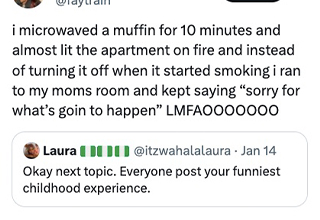
Some men seek greatness. Others seek fame. However, some just want to say “fuck” to every single word in the English language.
The “Fuck Every Word” account has been a staple of both weird and normal Twitter alike since 2014. Inspired by the normie bots of early Twitter, @FuckEveryWord’s mission is simple: to add the word “fuck” in front of as many words as possible.
While this goal may seem easy enough, the act of tweeting the dictionary with added vulgarity has resulted in bans, takedown requests from religious groups, and, of course, a lot of people getting needlessly pissed off at a robot.
Back in 2017, one of the founders spoke to The Outline about his experience running the account after it was banned for automatically posting a naughty word. At the time, the creator said he wouldn’t remove words from the bot’s dictionary, writing, “Racial slurs are a part of the language. There were complaints for many other racial epithets, religions, sexuality slurs and my stance is the same.” He then jokingly floated the idea that, given the political climate at the time, the dictionary itself could be banned in some schools.
Even though that actually ended up happening, the creator’s approach in the years since has softened somewhat. He routinely edits the list of words used for the account, adding newer words like “rizz” while taking out some words that could be considered objectionable. The whole process is also more open, with the creator accepting suggestions on the account’s website about how the list — and the project itself — can be improved.
As far as the creator himself goes, he prefers to remain somewhat anonymous, letting the account and the jokes that stem from its posts speak for themselves. Despite this, I recently spoke with him to hear about the account’s origins, its scandals and some of its greatest (fucking) hits.
What inspired you to start saying “fuck” in front of every word?
The genesis of it, I would say, was on Weird Twitter around 2012-2013. There was an account that did this without the language in front simply called “every word.” One of the joys of that account was the context jokes that were related to the progression of words that were coming through, which, in my opinion, inspired many other contextless accounts on Twitter.
weed
— everyword (@everyword) April 19, 2014
[The] “every word” account finished, from A to Z, and that was the end of that. At the time, I was part of a group of folks who were creating various accounts on Weird Twitter. We did a lot of accounts that were successful, and some that weren't successful, in the theme/parody account-type space. Eventually, we decided that it’d be kind of funny to do every word, but with a twist — with, obviously, the F word in front of everything. We launched it, and I initially tweeted manually from TweetDeck for the first 1,000 or so because at the time I had no programming experience. But luckily, someone reached out and noticed that we were doing it that way, and it became a bot. I was able to be hands off with it, and the rest is kind of history.
fuck america
— fuck every word (@fuckeveryword) July 15, 2014
Do you remember the first word that got a lot of attention?
The first one that I can think of that was truly just a regular word was “America.” That was the first viral one. But when we first started the account, there was a lot more manual work to it, and we weren’t really sure if we were going to follow the dictionary exactly or if it was going to be more of a meme account. So one of the first words that we did right after “a” was, I believe “/a,” which was the reference to the anime board on 4chan. That was the first one that got a lot of attention. But after I did this a few hundred times, I realized that we were on a better track to just follow the dictionary, and “America” is the first one that comes to mind.

I can imagine that, even with the limited terms of service left on X/Twitter, there’d be a few words in that set that would be a problem when running an account like this.
There are words that can be problematic, but have a real definition. When that’s the case, I tend to leave them alone and just see what the reaction is. But when there’s words that serve no purpose other than to be problematic, those are ones that I now try to review or remove [from the list]. It’s imperfect. There’s no kind of machine editing for that.
Fuck Every Word’s ban appeal has been denied. The bot was promoting violence, apparently. pic.twitter.com/dCEBCBGV8U
— hawk (@hawktherapper) December 22, 2017
On that topic, the account has been banned in the past. Do you know why that was?
I want to say it was 2017, but we approached the “n’s” — everybody knows there’s a pretty inappropriate word in that section, which the bot tweeted indiscriminately. That generated a lot of interaction. I don’t think [Twitter] had a strict content policy at the time, but just the overwhelming amount of eyes that were on it, they had to take some action. So that was the only time [the account] was formally taken down.
Every [post] that’s been deleted has been tied to hate speech. I don’t think we were asked to remove, you know, “F Christians” or “F Muslims” or things like that, but — I don’t want to say the exact groups, but there are groups that have had tweets removed. It depends on a lot, but in general, I would disagree with removing words that are part of the vernacular in a non-offensive way. But that’s [X/Twitter’s] prerogative. It’s happened so rarely, but there have been cases.
fuck norman
— fuck every word (@fuckeveryword) July 9, 2023
Have you had any times where one of the automatically tweeted posts generated controversy that caught you off-guard? I did see that one of your most interacted with posts was just “fuck Norman.”
Norman’s a great example where I’ve become more and more aware that there are different communities within Twitter that are very large. I guess “Norman” blew up because it seems like there was some French [internet personality] that was problematic. That caught me off guard — I was sitting with my wife at the time, and I’m like, ‘I have no idea.’
I would say the ones that generate the most unexpected kind of controversy or reaction are the ones that are very meaningful to people in individual communities. In the very, very early days, there were terms that were in the dictionary that were related to different religions that I don’t claim massive familiarity with. We received some communication from religious groups over those. For the unexpected ones, for as many people have had reactions to them, I haven’t felt that there was a significant controversy.
fuck fuck fuck fuck fuck fuck fuck fuck fuck fuck fuck fuck fuck fuck fuck fuck fuck fuck fuck fuck fuck fuck fuck fuck fuck fuck fuck fuck fuck fuck fuck fuck fuck fuck fuck fuck fuck fuck fuck fuck fuck fuck fuck fuck fuck fuck fuck fuck fuck fuck fuck fuck fuck fuck fuck …
— fuck every word (@fuckeveryword) December 2, 2023
On December 2nd, you tweeted, “fuck fuck fuck fuck fuck fuck fuck fuck fuck fuck fuck fuck fuck fuck fuck fuck fuck fuck fuck fuck fuck fuck fuck fuck fuck fuck fuck fuck fuck fuck fuck fuck fuck fuck fuck fuck fuck fuck fuck fuck fuck fuck fuck fuck fuck fuck fuck fuck fuck fuck fuck fuck fuck fuck fuck.” What the fuck happened there?
Basically, I do the list on Google Sheets. I do a lot of coding or programming based on Google Sheets, so I try to limit the cache that it goes through. And what I do for a placeholder is generally put something in where I stopped working, where I need to continue reviewing the script. That was my bookmark, and what you saw was essentially laziness — the bot had caught up to where I was in the mapping and published that. But it got such a nice response that I left it up.
Ah. So when people talk about casual sex, this is the other option. https://t.co/z58P3n914L
— bort (@markl171) November 5, 2021
Anything else you want to plug?
Not really. If people go to the website and they want to see some of our other automation projects, or the things that I’m interested in — I really like fantasy, so a lot of the work that I do is not in the same stratosphere as this account. But I just appreciate that people like the bot. And obviously, it’s a statement originally on how things are funny because of the context that they’re in, so when people respond to the bot and add their own context and their own flair to it, that’s the interesting part. So I do appreciate that people engage with it. We’re always open to feedback, and you know, people generally aren’t shy.






4 Comments